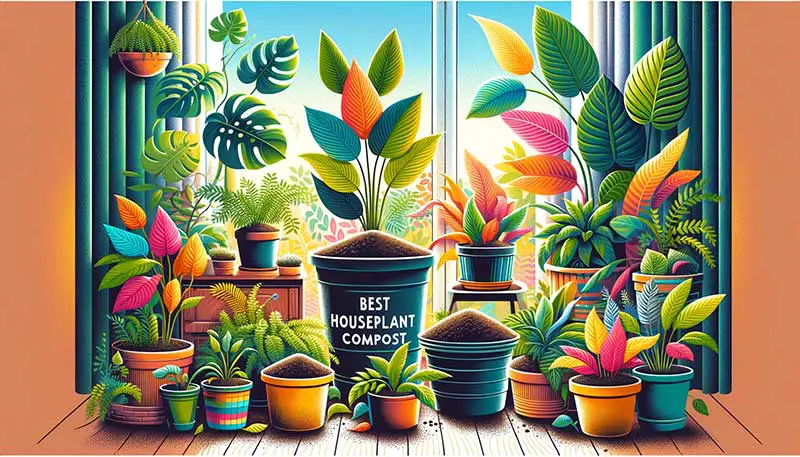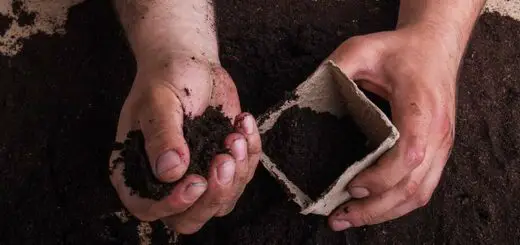Best Houseplant Compost
The best compost for houseplants is one that provides a rich, balanced nutrient mix while ensuring proper drainage and aeration. Organic compost, specifically tailored for indoor plants, strikes this balance perfectly. It is made from decomposed organic matter like leaves, kitchen scraps, and manure, which enriches the soil with essential nutrients. This type of compost not only supports robust plant growth but also enhances soil health, making it an ideal choice for gardeners seeking a natural and sustainable option for their indoor greenery.
But why stop at just knowing the best compost? Your houseplants deserve a thriving environment, and understanding the why and how of organic compost can transform your indoor gardening experience. In this comprehensive guide, we delve into the secrets of creating and utilizing the perfect compost mix for your houseplants. From DIY recipes to balancing moisture and aeration, and even tackling common indoor plant challenges, we’ve covered everything you need to turn your home into a lush, green oasis.

Introduction to Organic Compost for Indoor Plants
Understanding organic compost and its significance in nurturing houseplants is crucial for any indoor gardener. This natural soil enhancer is created from decomposed organic materials, such as plant leaves, kitchen waste, and animal manures. It is rich in nutrients and beneficial microorganisms, making it an excellent medium for plant growth.
By incorporating organic compost into your houseplant care routine, you are not just feeding your plants; you’re also improving soil structure, enhancing its ability to retain moisture, and boosting its overall health. This leads to stronger, more resilient plants, capable of withstanding pests and diseases more effectively.
Top Organic Compost Options for Houseplants
When it comes to selecting the right compost mix for your indoor plants, variety is key. Each type of compost offers unique benefits:
- Leaf Mold: Created from decomposed leaves, this compost is fantastic for improving soil structure and moisture retention.
- Vermicompost: Produced by worms digesting organic waste, it’s rich in nutrients and beneficial microbes, perfect for promoting healthy plant growth.
- Composted Bark: Ideal for orchids and other epiphytes, this compost provides excellent aeration and drainage.
- Kitchen Waste Compost: Made from everyday kitchen scraps, it’s a nutrient-rich option for general houseplant use.
- Well-Rotted Manure: Particularly good for large indoor plants, it adds both nutrients and structure to the soil.
Remember, the choice of compost depends on the specific needs of your houseplants. Some plants thrive with moisture-retentive compost, while others need a mix that offers better drainage.
DIY Compost Mixes for Indoor Plant Care
Creating your own compost mix can be a rewarding aspect of indoor gardening. Here’s a simple guide to making a balanced compost mix:
- Start with a Base: Use a combination of garden soil and coir or peat moss as your base. This provides structure and retains moisture.
- Add Nutrient Sources: Incorporate composted kitchen waste, leaf mold, or well-rotted manure for nutrient enrichment.
- Ensure Good Drainage: Mix in perlite or vermiculite to ensure adequate drainage, crucial for preventing root rot.
- Balance the pH: If necessary, adjust the pH of your compost mix. Most houseplants prefer a slightly acidic to neutral pH.
- Let it Mature: Allow your compost mix to mature for a few weeks before using it. This ensures that the nutrients are fully integrated and ready for your plants.
Eco-Friendly Composting Techniques for Urban Gardeners
Urban gardening presents unique challenges, especially when it comes to composting. However, with innovative approaches, even those with limited space can create effective, eco-friendly compost for their houseplants:
- Bokashi Composting: This Japanese method ferments kitchen waste, including dairy and meat, in an anaerobic environment. It’s perfect for small spaces and produces nutrient-rich compost quickly.
- Worm Composting (Vermicomposting): Utilizing red wigglers to break down organic matter, this technique is suitable for indoor use and produces high-quality compost and liquid fertilizer.
- Countertop Composting: Compact compost bins designed for kitchen countertops are ideal for small-scale composting, turning daily kitchen scraps into valuable compost.
- Community Composting: For those with extremely limited space, participating in community composting programs can be an effective way to recycle organic waste.
Each method offers a sustainable way to create compost, ensuring that even urban dwellers can contribute to a greener environment and nourish their indoor plants.
The Role of Compost in Promoting Plant Health
Compost plays a multifaceted role in enhancing the well-being of houseplants. It’s not just about providing nutrients; compost also improves soil structure, which is crucial for root development and water retention. Here are some key benefits:
- Nutrient Supply: Compost slowly releases a spectrum of essential nutrients, which are easily absorbed by plant roots.
- Soil Structure Enhancement: Adding compost to soil improves its texture, promoting better root growth and water drainage.
- Microbial Activity: The microorganisms in compost help in breaking down organic matter into nutrients, and also play a role in protecting plants from diseases.
- pH Balance: Good quality compost can help in maintaining an optimal pH level in the soil, which is vital for nutrient uptake.
Understanding these aspects can help indoor gardeners appreciate how compost contributes to creating a healthier environment for their plants.
Decoding Compost Ingredients: What’s Best for Your Indoor Garden?
The composition of compost is crucial in determining its suitability for different houseplants. Here’s a breakdown of common compost ingredients and their benefits:
| Ingredient | Benefits for Houseplants |
| Green Kitchen Waste | Rich in nitrogen, ideal for leafy plant growth. |
| Brown Material (Leaves, Paper) | Adds carbon, improves soil structure. |
| Coffee Grounds | Slightly acidic, great for pH-sensitive plants. |
| Eggshells | Adds calcium, beneficial for plant cell growth. |
| Banana Peels | High in potassium, good for flower and fruit production. |
Balancing Moisture and Aeration in Houseplant Compost
The health of houseplants heavily depends on the right balance of moisture and aeration in the soil. Compost, being a key component, plays a pivotal role in this balance:
- Moisture Retention: Organic compost has excellent water-holding capabilities, ensuring that plants remain hydrated. However, it’s crucial to avoid waterlogging, which can lead to root rot.
- Aeration: Good compost should not be too dense; it needs to allow air to circulate freely to the roots. Incorporating materials like perlite or coarse sand can improve aeration.
- Monitoring Water Needs: Regularly check the moisture level of your compost. Stick your finger about an inch into the soil; if it feels dry, it’s time to water.
- Drainage: Ensure that your pots have adequate drainage to prevent excess water from accumulating.
Organic Compost and Pest Control: Natural Solutions for Healthy Plants
Organic compost can be a powerful ally in controlling pests in a natural way. The key lies in fostering a healthy soil ecosystem:
- Disease Suppression: The beneficial microorganisms in compost can help suppress soil-borne diseases and reduce the incidence of pests.
- Healthy Plant Growth: Vigorous plants are less susceptible to pests. Compost enriches the soil, leading to stronger plants.
- Natural Repellents: Some compost ingredients, like crushed eggshells or coffee grounds, can act as natural deterrents for certain pests.
- Companion Planting: Incorporating compost in companion planting can further enhance pest control, as certain plant combinations naturally repel pests.
Seasonal Compost Tips for Indoor Plants
Adjusting your composting practices according to the seasons is essential for the well-being of houseplants:
- Spring and Summer: This is the growing season for most plants. Enrich your compost with more nitrogen-rich materials to support growth.
- Fall and Winter: During these dormant months, reduce the frequency of compost addition. Focus on maintaining soil health without over-fertilizing.
- Temperature and Humidity Adjustments: Be mindful of the indoor temperature and humidity levels, as these can affect the compost’s performance.
Real-life Success Stories: Transformations with Organic Houseplant Compost
Inspirational stories from real people can vividly illustrate the impact of organic compost on houseplants:
- Case Studies: Share experiences of individuals who transformed their struggling houseplants into thriving greenery using organic compost.
- Before and After Images: Visuals can be powerful. Include photos showing the improvement in plant health and growth.
- Tips and Tricks: Alongside these stories, offer practical advice and tips that readers can apply to their own plants.
FAQs on Best Houseplant Compost
Q: Can I use outdoor garden compost for my indoor plants?
A: Yes, you can use outdoor garden compost for indoor plants, but ensure it’s well-rotted and free from pests and diseases. It’s also advisable to mix it with indoor potting mix to ensure proper drainage and aeration for houseplants.
Q: How often should I add compost to my indoor plants?
A: Generally, adding compost to indoor plants every 4-6 months is beneficial. However, this can vary based on the plant type and the compost’s nutrient density.
Q: Is it possible to over-fertilize houseplants with compost?
A: Yes, over-fertilizing with compost can happen, leading to nutrient burn or imbalances. It’s important to use compost sparingly and according to the specific needs of each plant.
Q: Can compost be used for all types of houseplants, including succulents and cacti?
A: While compost is beneficial for most houseplants, succulents and cacti prefer a more mineral-rich and less nutrient-dense soil. It’s best to use compost in moderation for these plants.
Q: Does the type of water I use affect the compost’s effectiveness for houseplants?
A: The type of water can influence soil pH and mineral balance. It’s ideal to use filtered or rainwater for watering composted plants, especially if your tap water is hard or chlorinated.
Q: How do I know if my houseplant needs more compost?
A: Signs that your houseplant might need more compost include slow growth, pale leaves, or a general lack of vigor. Before adding more compost, ensure that other factors like lighting and watering are also optimal.
Q: Can I use compost as the only growing medium for my houseplants?
A: Compost should not be used as the sole growing medium for houseplants. It’s best used in conjunction with a potting mix to ensure proper drainage and root support.
Q: Are there any houseplants that should not be given compost?
A: Plants with very specific soil requirements, like some orchids or carnivorous plants, may not benefit from standard compost. It’s important to research the specific needs of each plant.
Q: Can I make compost that is tailored to specific types of houseplants?
A: Yes, you can tailor your compost mix to suit specific plants by adjusting the ingredients. For example, acid-loving plants might benefit from compost with coffee grounds, while flowering plants may appreciate more phosphorus-rich ingredients.
Q: How long does it take for compost to start benefiting my houseplants?
A: The benefits of adding compost to houseplants can be seen in as little as a few weeks, with improved growth and vigor as the compost begins to enrich the soil.


